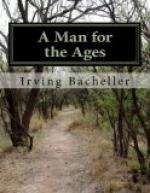His conscience had prevailed. The speech was delivered. Douglas, the Democratic candidate, came on from Washington to answer it. That led to Lincoln’s challenge to a joint debate. I was with him through that long campaign. Douglas was the more finished orator. Lincoln spoke as he split rails. His conscience was his beetle. It drove his arguments deep into the souls of his hearers. The great thing about him was his conscience. Unless his theme were big enough to give it play in noble words he could be as commonplace as any one. He was built for a tool of God in tremendous moral issues. He was awkward and diffident in beginning a speech. Often his hands were locked behind him. He gesticulated more with his head than his hands. He stood square-toed always. He never walked about on the platform. He scored his points with the long, bony, index finger of his right hand. Sometimes he would hang a hand on the lapel of his coat as if to rest it. Perspiration dripped from his face. His voice, high pitched at first, mellowed into a pleasant sound.
One sentence in Lincoln’s speech at Ottawa thrust “The Little Giant” of Illinois out of his way forever. It was this pregnant query:
“Can the people of a United States territory in any lawful way and against the wish of any citizen of the United States exclude slavery from its limits prior to the formation of a state constitution?”
He knew that Douglas would answer yes and that, doing so, he would alienate the South and destroy his chance to be President two years later. That is exactly what came to pass. “The Little Giant’s” answer was the famous “Freeport Heresy.” He was elected to the Senate but was no longer possible as a candidate for the Presidency.
I come now to the last step in the career of my friend and beloved master. It was the Republican convention of 1860 in Chicago. I was a delegate. The New Yorkers came in white beaver hats enthusiastic for Seward, their favorite son. He was the man we dreaded most. Many in the great crowd were wearing his colors. The delegations were in earnest session the night before the balloting began. The hotel corridors were thronged with excited men. My father had become a man of wealth and great influence in Illinois. I was with him when he went into the meeting of the Michigan delegates and talked to them. He told how he came West in a wagon and saw the spirit of America in the water floods of Niagara and went on to the cabin village of New Salem and saw again the spirit of America in the life of the boy, Abe Lincoln, then flowing toward its manhood. When he sat down the Honorable Dennis Flanagan arose and told of meeting the Traylor party at the Falls when he was driving an ox-team, in a tall beaver hat; how he had remembered their good advice and cookies and jerked venison.
“Gentlemen,” he said, “I am willing to take the word of a man whose name is hallowed by my dearest recollections. And believing what he has said of Abraham Lincoln I am for him on the second ballot.”




